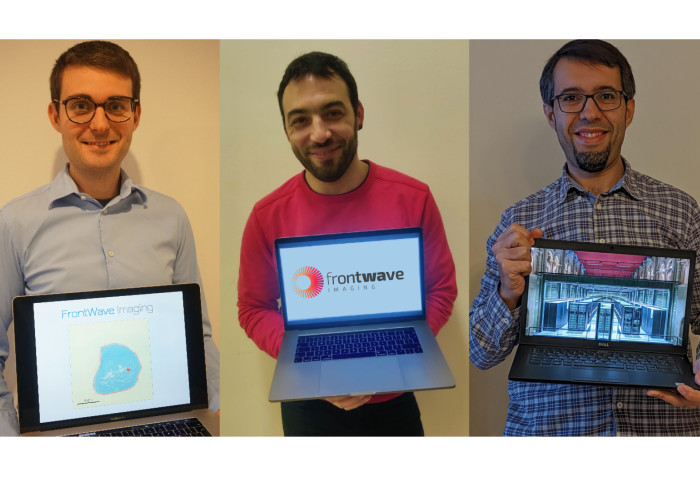New startups in the Faculty of Engineering
by Helen Wilkes

The founders of Frontwave: Dr Oscar Calderon Agudo, Dr Lluis Guasch and Dr Josep de la Puente (Barcelona Supercomputing Centre)
Several startups from across the Faculty of Engineering have launched recently, spanning wearable tech, medical diagnosis and more.
Frontwave
Frontwave Imaging S.L. is a startup from Imperial College London and the Barcelona Supercomputing Center. The company focuses on the business of medical diagnosis of breast cancer through the use of supercomputing and ultrasound technology. The team, led by Dr Óscar Calderón Agudo and Dr Lluís Guasch, is currently developing an end-to-end imaging software solution for obtaining high-resolution quantitative images of soft tissue for cancer characterization with ultrasound, specifically for breast cancer, that can be easily utilized by non-experts in ultrasound. International market launch is expected in 2023. The founders said: ‘Our software allows breast cancer screening without the use of X-rays by combining cutting-edge advances in supercomputing, imaging methods and ultrasound to produce highly detailed images of the breast for patients at all ages, at a low cost and anywhere, which can drastically transform current screening programs.’
The founders said: ‘Our software allows breast cancer screening without the use of X-rays by combining cutting-edge advances in supercomputing, imaging methods and ultrasound to produce highly detailed images of the breast for patients at all ages, at a low cost and anywhere, which can drastically transform current screening programs.’
Biomex
 Biomex is developing smart wearable tech to help people with musculoskeletal conditions. Neuromuscular electrical stimulation technology, which has been used at the elite sporting level and in the NHS for many years, lies at the core of its devices which leverage emergent technologies such as AI to broaden clinical use and achieve personalised therapeutic effects.
Biomex is developing smart wearable tech to help people with musculoskeletal conditions. Neuromuscular electrical stimulation technology, which has been used at the elite sporting level and in the NHS for many years, lies at the core of its devices which leverage emergent technologies such as AI to broaden clinical use and achieve personalised therapeutic effects.
Led by Dr Lance Rane and Professor Anthony Bull of the Department of Bioengineering and aided by a recent Innovate UK Smart Grant, the team is currently developing its first products, with applications for patients with knee osteoarthritis and athletes following sports injury, for market entry in 2022.
Reco Medical
 RECO Medical aims to bring a wireless and wearable intracranial pressure (ICP) monitoring implant system to market. ICP monitoring is an extremely important part of neurosurgical care. If untreated, elevated ICP may result in serious complications including disability and death. Current ICP monitoring systems involve a surgical procedure - introducing a probe through the skin and skull. These systems restrict patients’ mobility and have significant risk of transcutaneous infection of the brain.
RECO Medical aims to bring a wireless and wearable intracranial pressure (ICP) monitoring implant system to market. ICP monitoring is an extremely important part of neurosurgical care. If untreated, elevated ICP may result in serious complications including disability and death. Current ICP monitoring systems involve a surgical procedure - introducing a probe through the skin and skull. These systems restrict patients’ mobility and have significant risk of transcutaneous infection of the brain.
Reco's wireless system has been developed over 12 years at Imperial. The implantable pressure sensor is based on quartz Surface Acoustic Wave (SAW) resonators. High quality factor and operating frequency allow for small sensor dimensions and a low power electronic reader, offering a truly wearable sensing solution. RECO was awarded a £500K Innovate UK Smart Grant in 2020 to complete sensor development and a chronic animal trial by 2022. RECO benefits from an experienced team of researchers, clinicians and medtech experts.
Article text (excluding photos or graphics) © Imperial College London.
Photos and graphics subject to third party copyright used with permission or © Imperial College London.
Reporter
Helen Wilkes
Faculty of Engineering